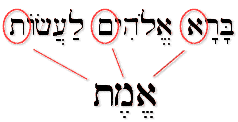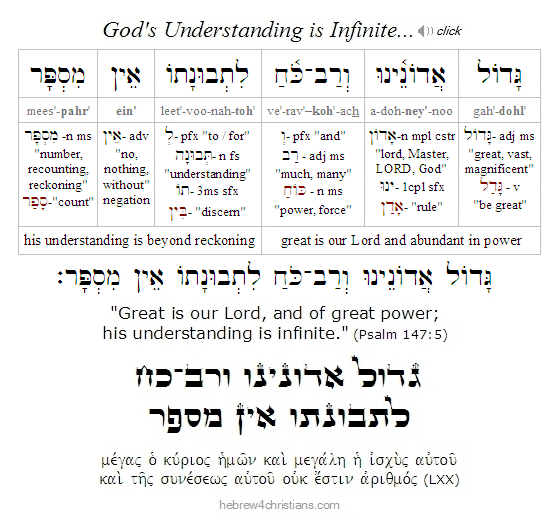|
In Parashat Ki Tisa we read that God was so angry regarding the sin of the Golden Calf that He threatened to destroy the fledgling Jewish nation -- and even said that He wanted to make Moses into a new sort of "Abraham" (Exod. 32:10). Moses was appalled at the prospect and appealed to God's reputation in this matter. Would not God's Name be profaned among the Egyptians if the LORD destroyed bnei Yisrael (the children of Israel) after leading them out of bondage? Moreover, what about the covenant promises God made to Abraham, Isaac, and Jacob (i.e., brit avot)? How could the LORD break His word to the patriarchs of Israel? Because of Moses' quick intercession, God's anger was stayed and an "opening" or opportunity was given for teshuvah (repentance). Moses' intercession caused God to "repent" (i.e., nacham: נָחַם), or to change His intent regarding executing judgment upon the people of Israel for the sin of the Golden Calf (Exod. 32:14).
The idea that God can "repent" seems to contradict other verses in Scripture that express God's "immutability" or changelessness. For example, the Torah says, "God is not a man, that He should lie, nor a son of man, that He should repent" (Num. 23:19). The prophet Malachi likewise attests, "I am the Lord, I change not" (Mal. 3:6).
Some linguists suggest that the root idea of the Hebrew word nacham (נָחַם) pictures God "taking a deep breath" (or even sighing) as way of expressing regret or feeling compassion in response to an offense by others... Indeed, the word for "breath" in Hebrew is ruach, and the breath of God is part of His Voice and Life... Others regard emotional expressions ascribed to God as a form of "anthropopathism," or the assigning of human feelings and emotions to God. The rationalist idea that dibra Torah k'lashon bnei adam, "the Torah speaks in the language of men," means that the authors of Scripture wrote in human language, in terms of human understanding, and we should therefore not expect to discover truths known only to God within its pages. This is not unlike the use of metaphor and poetry in Scripture. When the Psalmist says that God is a Rock (Psalm 18:46), or that we can find refuge under the "feathers of His wings" (Psalm 91:4), we should not think that God literally is made out of a "divine mineral" or has a wingspan...
When the Scriptures say, "I am the LORD, I change not" (Mal. 3:6), the verb translated "change" is shaniti (שָׁנִיתִי), which comes from the verb shanah (שָׁנָה) meaning "to repeat, to do again." Indeed, the Hebrew word for "year" is shanah, referring to the cycle of the mo'edim or seasons (Gen. 1:14). The idea seems to be that God does not change like the fixed order of creation (i.e., the stars, the seasons, etc.), and by implication, that God is not subject to the "life cycle" of the natural order, with birth, life, and death. God "changes not" in the sense that He is not subject to the vicissitudes of physical creation, even though His relationship to creation is living and dynamic rather than passive or static.
Traditional Christian theology tends to regard God in Greek, rather than Hebrew, terms. Indeed, the word "theology" itself is Greek (not Hebrew) and refers to the "study of God" (θεός + λόγος), implying that God is an "object" that could be looked at, "analyzed," and known as a "thing" or divine "substance." To the ancient Greeks, the idea of God is disclosed through a process of intellectual abstraction -- through "negative theology" (i.e., denying predicates of human language to the divine), and so on. Ultimately this led to the Greek ideal of God as an "Unmoved Mover," an Immutable Divine Mind, and so on. Insofar as the early church embraced pagan Greek assumptions and thinking, its attempt at understanding God followed course, and even the study of the Scriptures became a kind of linguistic archaeology, where specimens (i.e., "texts") were looked at, a taxonomy was created, and the entire system was displayed as a museum for the mind...
The idea that God is "changeless" is expressed in various contemporary Church catechisms, such as this statement from the Westminster Catechism: "God is infinite, eternal and unchangeable in His Being. His nature or character is immutable, that is, it has never worsened or bettered - it remains the same. God does not change, indeed, he cannot change, both in his being (ontologically) and in his will (decretally)."
How different is the picture of God we see during Moses' personal intercession on behalf of Israel, when he spoke "face to face" (i.e., panim el panim: פָּנִים אֶל־פָּנִים) with the LORD from the midst of the cloud. Here we see God "breathing deeply," that is, expressing regret or feeling compassion in response to the actions of His sinful people... God is not some static object but rather a dynamic and forceful Person. Unlike the Greek philosophers who tended to regard God as little more than a "machine" (deus ex machina) or device that caused the universe to "get going," the LORD God of Israel is intensely personal, feeling, emotional, compassionate, angry, and so on. The Hebrew view of God is that of a Living Person, a Speaking Word, and a Fiery Breath broods that over the events of the physical world.
The idea that God can "repent," then, is connected with His intimate interaction with His creation, and in particular, with His people. Still, it is an interesting question as to whether it was possible for God to have gone through with His threat and destroyed the Jewish nation, making of Moses a new sort of "Abraham." What about Jacob's prophecy that the Messiah would come from Judah (Gen. 49:10)? Indeed, how are we to understand the various "counterfactual" statements we read in the Scriptures? For example, when Yeshua decried the hardness of heart of the people of Capernaum, He said: "For if the mighty works done in you had been done in Sodom, it would have remained until this day" (Matt. 11:23). For this to have been a true statement (and of course it was, being spoken by the Savior), then it would have to correspond to something possible, a state of affairs that "could have been." In other words, had Yeshua gone to Sodom and done His great works, the people there would have repented and the city would not have been destroyed...
Classical Christian theology is draws much of its inspiration from the pagan philosopher Plato who taught that "truth" was a static property that pertains to propositions. This conception inevitably led to metaphysical speculations about "essences" and "universals" as something "more real" than the everyday world of particular cats, trees, and water lilies. Appearance and reality are two different things, and only by means of abstraction (from the particular to the universal) can the truth about ultimate reality be known. Hence we see various Christian theologians, unwittingly steeped in Greek thinking, arguing about ousia, "substance," and formalizing their conception of the Godhead as "three Hypostases in one Ousia." Even later theology that followed Aristotle more than Moses (e.g., Thomas Aquinas, Maimonides, etc.) got caught up in this sort of sophistry...
The Hebraic conception of truth, while not denying the importance of intellectual correspondence, seems to have a different focus. The Hebrew mind seemed less preoccupied with static and unchanging essences than with the (dynamic) formation of the character of the person (resulting in a sense of obligation to "restore" the world). Especially in relation to the LORD, to Whom the Jew must give account, the idea of truth became grounded in moments of moral decision encountered in one's life. Shall I steal? Shall I turn a blind eye to social injustice? etc.
Certain Jewish sages said that "the seal of God is truth," since the final letters of the three words that conclude the account of creation -- bara Elohim la'asot ("God created to do" [Gen. 2:3]) -- spell the word for truth (emet):

In other words, God created reality "to do" (la'asot), which has come to be interpreted by these sages as meaning that it is our responsibility, as God's creatures, to complete the "doing" of His Creation (tikkun olam). Truth is about doing, not "being"; it is centered upon the realm of duty and obligation -- our personal relationship to God -- just as it is grounded in God's mandate to us to "name" the creation.
Note that the "Seal of God" is not just a matter of sincerity. It is rather a matter of being true in the sense that you are living it, you are "one with it," you are part of it. You exist inside this truth as a passion and this truth informs all of the decisions you make in life.
The idea that we can genuinely appeal to God is central to the idea of teshvuah, or "repentance." Abraham Heschel wrote, "No word is God's final word. Judgment, far from being absolute, is conditional. A change in man's conduct brings about a change in God's judgment" (The Prophets, p. 194). In other words, our relationship to God is not "prewritten," and therefore we can appeal to God for mercy and grace. Teshuvah is our appeal for God's compassion; it is the way we can relate to Him as our merciful LORD (YHVH) instead of our Judge (Elohim). When we truly turn to the LORD we receive His compassion.
"Today is the day of salvation." If you hear His voice, do not harden your hearts and become am k'she oref (עַם־קְשֵׁה־ערֶף), a "stiff-necked people" (Heb. 4:7, Exod. 32:9). The word nacham (נחם) pictures God "taking a deep breath" (or sighing) but it also indicates comfort and compassion (Gen. 5:29, Psalm 23:4, Isa. 12:1, 40:1, 52:9, etc.). The Breath of God is His compassion extended to you, just as Yeshua breathed His last breath on the Cross and later breathed on His followers saying, "Receive the Holy Spirit" (John 20:22).
Hebrew Lesson
Psalm 147:5 reading (click for audio):
 |
Ask the LORD to open your eyes to His Presence so that you may draw near to Him now... Shalom, chaverim.
|




